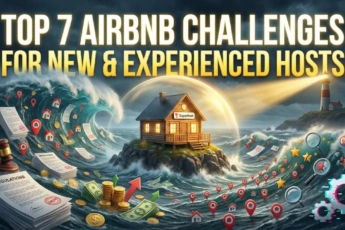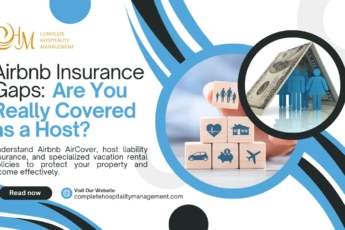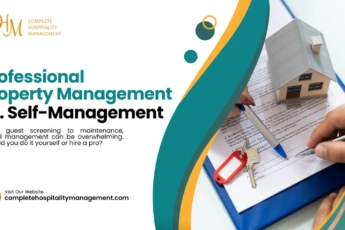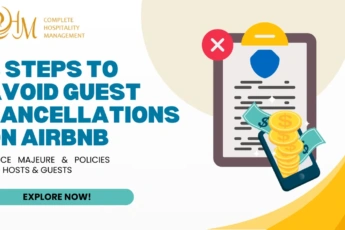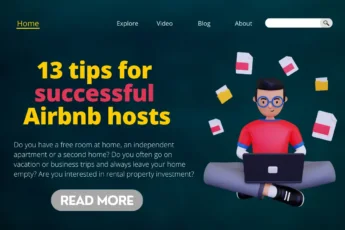20 Airbnb Host Mistakes to Avoid at All Costs in 2026 – Examples & Advice on How to Fix Them
The importance of an Airbnb host’s attentiveness and professionalism cannot be underestimated. However, it is crucial to recognize that even the most conscientious Airbnb hosts can make mistakes and compromise the guest experience.
In this article, we will explore several common mistakes Airbnb hosts make. Our goal is to raise awareness among hosts to improve the hosting experience and build trust with their guests. Fixing these mistakes does not necessarily require a large expense or a lot of time. As you read on, you will discover that sometimes, a simple solution to the problem can be found in just a few minutes.
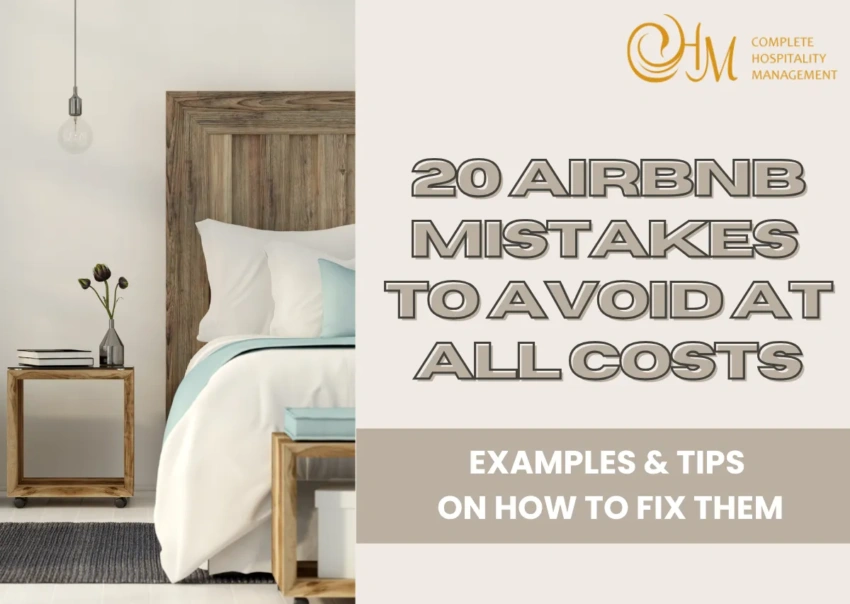
20 Airbnb Mistakes to Avoid at All Costs
1. Not Knowing Your City’s Regulations
With the platform’s rapid growth, many jurisdictions have implemented stricter rules to govern vacation rentals. Regulations can vary, from banning lockboxes to requiring you to register your property with local authorities.
Here’s how to avoid this mistake:
- Learn about the specific regulations in your area. Find out if you’re allowed to rent out your property, if there are any size restrictions, and if you need a license or permit to operate legally.
- Consider the tax obligations associated with renting out your property. Learn about any local or state taxes you may need to collect and pay. Review current tax laws and ensure you comply with your tax filing obligations.
2. Posting Misleading or Inaccurate Listings
It can be tempting to embellish your rental to make it more appealing, but honesty in your listing is key to getting off to the best possible start on Airbnb. Often, a misleading description that doesn’t match the reality of your home will backfire in the form of a negative review.
It’s best to ensure your guests know exactly what to expect when they view your listing. To optimize your listing writing, you could use some tools like ChatGPT.
Example with “forgetting” to mention certain details
Imagine that you booked accommodation that seemed great, well located, well decorated, clean, and a rare gem. But when you arrived, it was disappointing that you couldn’t stand up straight in the apartment without bumping into the ceiling! It was an old garage that had been converted (with quality and taste), but the owners didn’t think it was helpful to mention in their listing how low the ceiling was.
Result: you spent the whole stay bumping into things, or walking stooped like a hunchback. We’ve had better times.
Besides, the double bed you were supposed to sleep in was actually two single beds pushed together. The bed frames prevented the mattresses from touching. So the romantic weekend with your girlfriend resulted in nights without even being able to hold hands. Rather disappointing.
Remember this: when you have defects in your accommodation, mention them. It is better to lose a few reservations and have only people who book knowingly, rather than pretending that everything is perfect, disappointing your customers, and collecting a bunch of negative comments.
Here’s a structure you could follow to write your listing better:
- Accurately describe the features of your property, such as the number of bedrooms and what’s included in each, such as bed size, storage, etc.
- Inform your guests about your rental’s amenities, facilities, and general benefits.
- Don’t be afraid to set boundaries or rules for your home, such as whether guests are allowed to bring additional visitors or pets, whether smoking is allowed, whether there are any off-limits areas in the home, etc.
Here’s an example you can use for your listings:
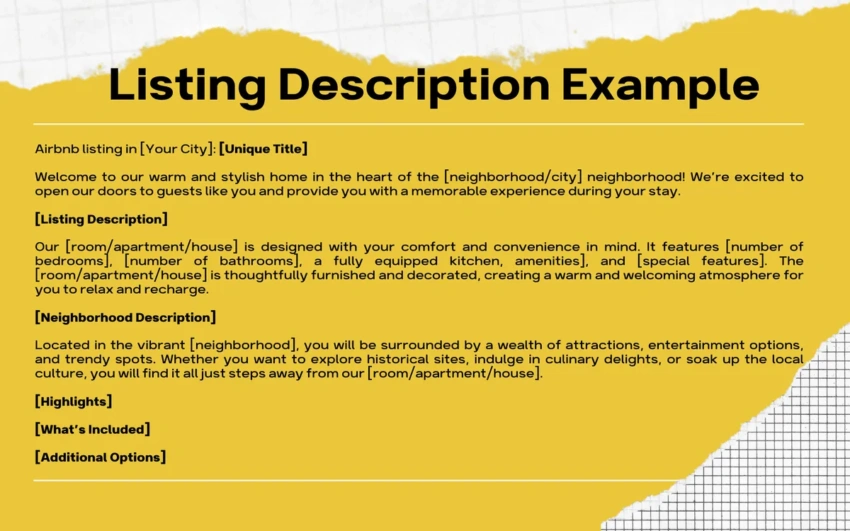
Example of structure of how each listing on Airbnb should be formatted
If you are having trouble setting up your Airbnb, you may want to consider optimizing services: rating analysis, SEO optimization, analyzing Airbnb listing’s statistics, Creating a clear strategy for becoming an Airbnb SuperHost, and many other things.
3. Being Stingy on the Bedding
Just imagine that you rented a flat where you never managed to sleep in a comfortable bed. Only spring mattresses where you woke up the next day with half a sciatica and a blocked back.
Keep in mind that, above all, your people are looking for a place to sleep. You must, therefore, make sure to offer them a comfortable, quality bed. Even if the rest of your accommodation may have small defects, the bed, along with cleanliness are the two most important elements.
Tips on bedding of your listing
| Mistake | Why it’s a problem | Solution |
| Cheap, uncomfortable mattresses | Guests wake up with back pain and leave bad reviews. | Invest in high-quality, supportive mattresses. |
| Old, worn-out bedding | Makes the bed look uninviting and unhygienic. | Replace bedding regularly with fresh, high-quality linens. |
| Insufficient pillows or blankets | Guests feel uncomfortable and cold at night. | Provide extra pillows and blankets for all preferences. |
| Dirty or stained sheets | Makes guests question the cleanliness of the entire place. | Always provide freshly laundered, spotless sheets. |
| Noisy bed frames | Squeaky beds disrupt sleep and cause frustration. | Use sturdy, noise-free bed frames. |
| Thin, low-quality pillows | Poor neck support leads to discomfort. | Offer a variety of plush and firm pillows. |
If your customers sleep well, they will be grateful and will not hesitate to come back to your place. Otherwise, you will never see them again. Trust me, invest in a good bed, you won’t regret it!
4. Shorten Distances Voluntarily
To help your future guests choose, indicate in the description of your accommodation the nearby amenities, public transport, and distances from tourist attractions. Anything that can mislead or deceive the customer is to be absolutely prohibited. Anything that can cause them to be disappointed, even if it is small. Be honest!
Often, when people book an Airbnb, they don’t know the city they’re going to. So they rely on the “map” tool to search for accommodation in the area that interests them, with one unknown factor: the actual distance from the city center. For instance, it can be supposed to be a 20-minute walk from the city center. In reality, walking at a good pace will take 40 minutes. It’s not the same music!
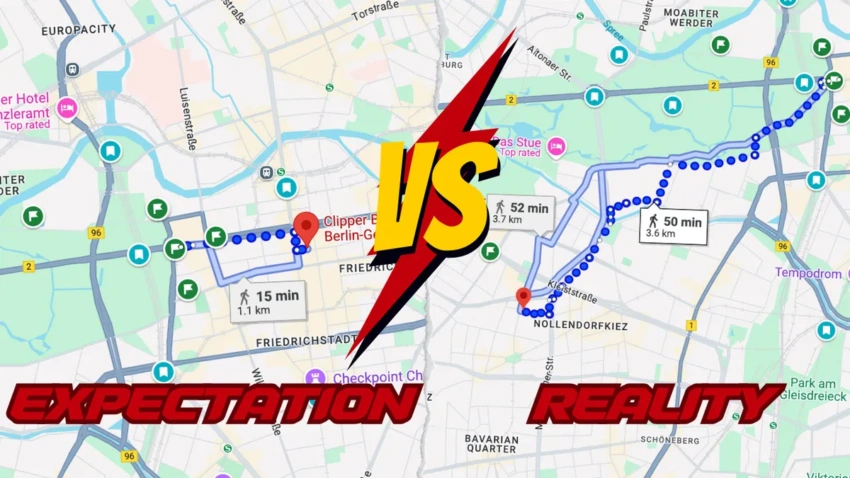
Indicate the actual distance from your apartment to, for example, the main attractions
It is from this disappointment that the bad comment will then come. It is a bit like when a friend tells you about a great movie that you absolutely have to see: your expectations increase, and finally, when you leave the cinema, you are disappointed because it was not so great. If the friend in question had not said anything, you would probably have felt better about the movie.
In short, keep this in mind: it is all a question of expectation. The more you raise your customers’ expectations, that is to say the more you make them believe in a palace, the more they risk being disappointed with what they will actually discover.
Even tend to behave oppositely: remain modest in the description to give your customers a pleasant surprise. From there will come the good comments, and the virtuous circle of reservations will begin.
5. Neglecting Professional Photos for Airbnb Listing
Images are crucial in convincing guests to choose your rental over another. However, it’s important to emphasize that the goal is not to misrepresent your property, but rather to present your rental in the best light.
Here’s how to avoid this Airbnb mistake:
- Include photos of activities and/or the neighborhood. If your property’s location is one of its strong points, your future guests will want to know what they can do in the area. Highlight the beautiful views, beaches, theme parks, and attractions nearby.
- Avoid showing a cluttered space. Clear kitchen counters, coffee tables, and desks of clutter. The less clutter, the better. Show your guests how they’ll find your place when they get there: clean and spotless.
- Make sure you have good lighting. Turn on the lights or open the blinds to make your space appear bright and welcoming. Try to take photos on a sunny day for better natural light.
- Write inspiring captions for your photos. Avoid purely descriptive captions and instead, create sentences that describe the experience your guests will have in your rental. For example, instead of simply captioning a photo of the balcony “Balcony,” you could write: “Relax and enjoy a glass of wine on our balcony after a long day of sightseeing.”
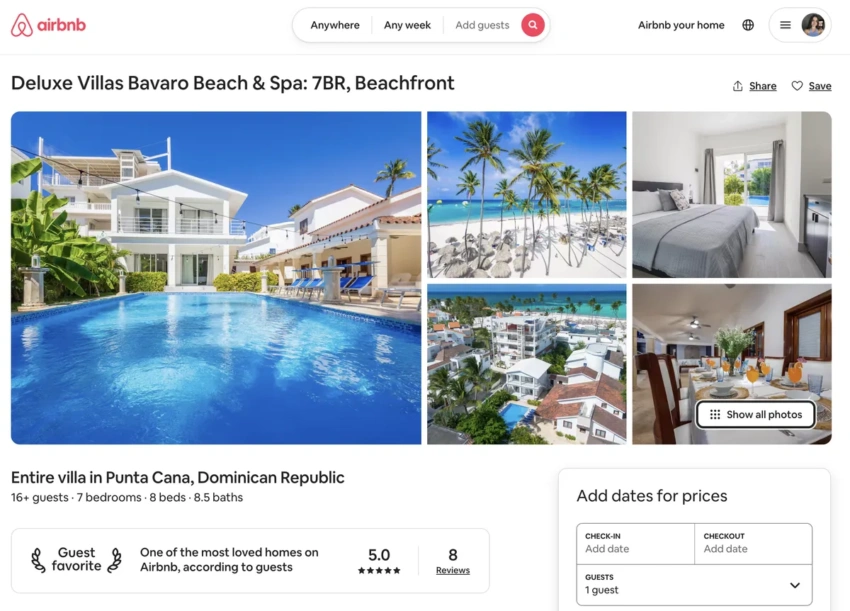
Airbnb listings with professional photos attract more people and hence get more reservations
The better the photos, the more likely you will get more Airbnb reservations. It is also essential to prepare the property before taking photos. You can read more about this in our article with 10 tips on it and book a pro photography & videography for real estate.
6. Not Having a Pricing Strategy
To maximize your revenue, staying informed about industry trends and adjusting your prices is important. Monitor market fluctuations and change your rates to attract guests at the right time.
- Check out AirDNA. Airdna collects and analyzes data from the Airbnb platform, such as rates, occupancy rates, listing performance, guest reviews, and more. This data is then presented to hosts through intuitive reports and dashboards. With this information, hosts can better understand the market in their area, assess the competition, adjust their rates based on demand, optimize their listings based on market trends, and more.
- Consider your competition. Research other similar rentals in your area. See which ones have the best reviews and compare their prices and availability to yours. Create a comparison chart to estimate the maximum annual revenue for your listing.
- Think about special events. Festivals, marathons, conferences, and other special events can bring more guests to your area. Take advantage of these opportunities to increase your rates, sometimes by up to five times your average daily rate. For example, during the 2024 Olympics in Paris, many hosts adjusted their property rates upward to take advantage of this unique opportunity and maximize their revenues.
7. Offering Accommodation With Questionable Cleanliness
You will probably tell us that offering clean accommodation to your guests is the basis of any vacation rental owner, and you are right.
Problem: out of 10 Airbnb accommodations, one is really disgusting (some guests even cancel their reservations because the smell is so unpleasant and the bathrooms are filthy), and two others are far from spotless (you don’t want to clean everything again before putting your bundle down, do you?).
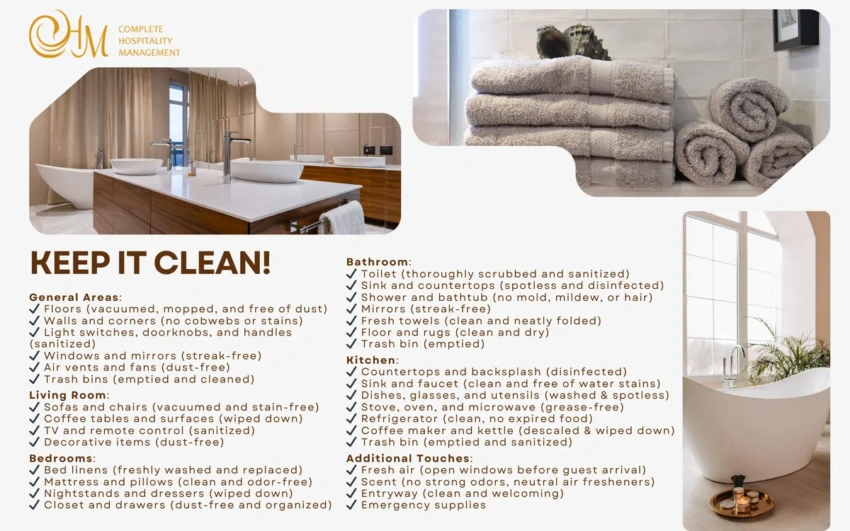
A list of things to pay special attention to before new guests arrive
The level of cleanliness expected can vary greatly from one person to another. What is clean for you will not necessarily be clean for your neighbor, and so on. To avoid any risk of getting a bad review, focus on cleaning. Don’t forget to check the cleanliness of the dishes you provide your customers.
If you don’t like cleaning yourself, hire a cleaning lady to avoid such mistakes and pass the cost on to your Airbnb bill afterward, applying the appropriate fees.
8. Not Leveraging Guest Review Generation
Guest trust is key on this platform, and guest reviews are important in their decision-making. When potential guests view your listing, they value the feedback left by other guests who have stayed with you.
Here’s how to avoid this mistake:
- Write a review for each guest, and it will encourage more guests to leave reviews in return. Not only will this build trust with future guests, but it will also give you better visibility. Your name and profile will appear more frequently on the platform, allowing more people to discover your property. Ultimately, this will improve your search ranking.
- Encourage reciprocal reviews (guests and hosts must write reviews for each other to appear on their profiles). When your listing starts to accumulate reviews, you’ll see bookings come in faster. This will positively impact your bookings and build your profile and reputation as a host.
9. In Case of Conflict, Blaming the Guest
Let’s suppose you rented a penthouse and wanted to use the washing machine offered by the landlady of the apartment. An old thing, a part of the drum, came off during the wash and tore up half of your t-shirts. You informed the landlady who, instead of sympathizing with my clothes and helping you find an amicable solution, attacked you by saying that you didn’t know how to use a machine, that hers had worked fine so far, etc.
This is a behavior that we advise you to avoid at all costs: if your tenants are unfortunate enough to suffer damage or harm in your apartment, show compassion. Show that you understand what is happening to them and that you will do everything to fix things.
It doesn’t matter who is responsible, whether it’s you or them. Be human and show that you care about them. This is your golden opportunity to project an excellent image of yourself and, therefore, minimize the risk of getting a bad review.
10. Poor Communication With Guests
Every interaction matters, from the first contact to writing a review after their stay. The speed of your response, how you communicate, and the accuracy of your responses can make a real difference in your guests’ experience. It is, therefore, essential to show your guests that you care about their stay and are there to support them.
Here is how to avoid these Airbnb mistakes:
- Use message templates. Airbnb property management software, such as Hostify, Smoobu, or Eviivo, offers pre-defined message templates to speed up your communication with guests. These automated templates allow you to save time and provide consistent responses. Every message received or sent on Airbnb will automatically appear in your account, providing centralized communications management.
- Use a unified inbox. Opt for a unified inbox for your rentals, where you can view all your guest communications from all your channels (Airbnb messaging, emails, etc.) in one place. This will allow you to stay up to date with the latest guest messages and respond without delay.
- Hire a professional property management company. If managing guest communication becomes overwhelming, a professional Airbnb property management company can ensure 24/7 guest support and high-quality interactions. These companies offer instant guest response services; seamless booking & check-in coordination; conflict resolution & issue handling; multilingual support.
We have a big article about the importance of communication with guests, which includes advice on how to improve this skill, what is important to pay attention to, what barriers exist in communication, etc.
Examples of Airbnb message templates by CHM Inc. (clickable)
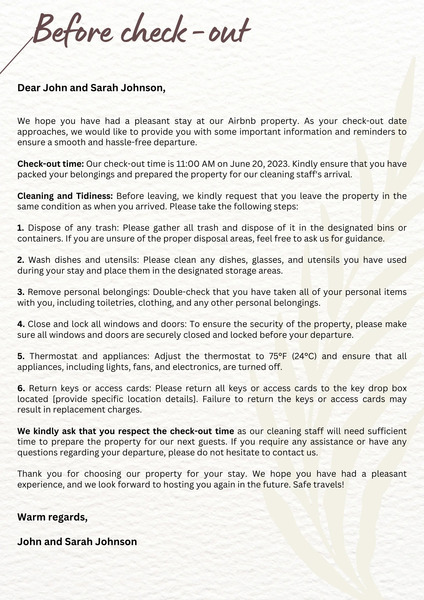 Before check-out instructions for Airbnb
Before check-out instructions for Airbnb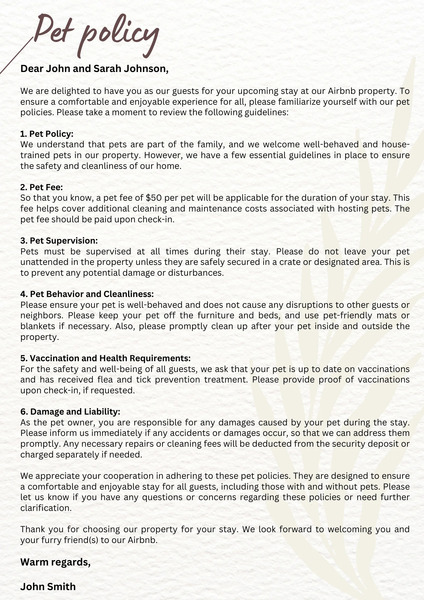 Pet policy for Airbnb guests
Pet policy for Airbnb guests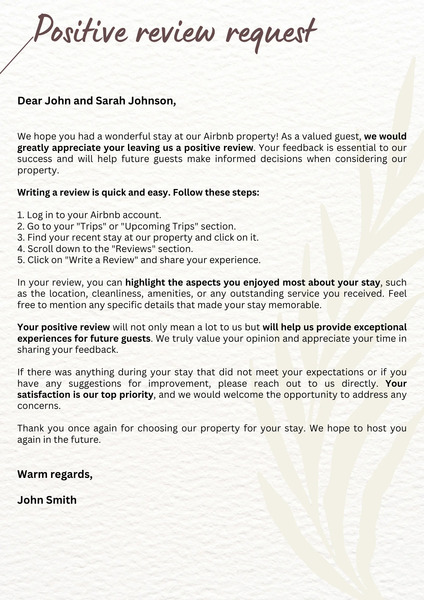 Example of message to request a positive review
Example of message to request a positive review Noise and party policies for Airbnb messages
Noise and party policies for Airbnb messages Check-in instructions for Airbnb messages
Check-in instructions for Airbnb messages11. Showing Up Late to Check-In
Put yourself in your travelers’ shoes for five minutes: they’re coming from far away, to a city they don’t know, with their big bags under their arms. They’re tired from the road, and all they want to do is put their things down and take a deep breath. Make sure they don’t have to wait.
We simply recommend that you agree with them on an approximate arrival time (be lenient if they’re late, they’re coming from far away!), and arrive on site about half an hour before their arrival. Take a good book and be patient. If you really are late for a reason beyond your control (it happens), let them know, apologize, and, above all, keep them informed so that they don’t worry.
12. Allow a One-Day Minimum Stay
Setting a minimum stay for your Airbnb rental is crucial to avoid mistakes with unauthorized parties, unwanted guests, and other inconveniences. Depending on the features of your property, it’s recommended to set a minimum stay of two nights to seven nights, unless you only offer long-term rentals.
A good strategy is to maintain a longer minimum stay (e.g., four nights or more) for bookings made more than 60 days in advance. This helps target longer, more desirable stays. As booking dates get closer, you can lower the minimum stay to two nights to maximize occupancy.
Here’s how to set a minimum and maximum stay for your listing:
- Go to your Calendar and select the calendar that matches your listing.
- On the right side of the screen, click on your Pricing and Availability settings.
- Choose the “Availability” tab.
- Next to “Length of stay”, you can update the minimum and maximum length of stay.
It is important to note that you can create custom rules for each day of the week. For example, you can set a minimum length of stay of 2 nights for arrivals on Friday, while for the other days of the week, a minimum of 1 night is enough.
13. Delays in Responding to Messages
Booking on Airbnb can be anxiety-provoking for tenants. Especially because Airbnb works on a peer-to-peer system, and that means in the minds of many users that there may be shortcomings, errors, or scams.
When the guest sends their payment, they receive a confirmation from Airbnb, but they are mostly waiting for a response from you, a reassuring and cordial message to tell them, in a way, “Don’t worry, I’m preparing a royal welcome for you, everything will go well, you can count on me”.
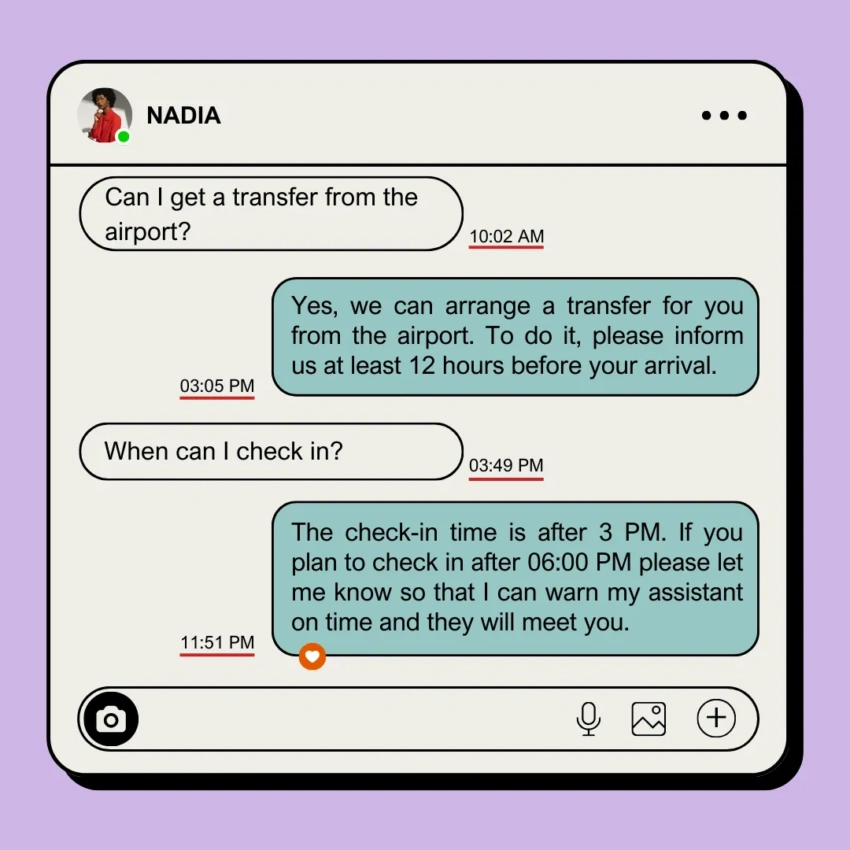
Responding too late is one of the main mistakes that causes Airbnb hosts to lose customers and their loyalty!
If you delay responding to guests’ messages (or if you don’t respond at all), you worry them, you put them in a state of stress, and they risk not having a good start to their stay with you. Don’t make mistakes like this when doing business on Airbnb!
14. Responding or Acting in an Impolite Manner
In the same vein, remember always to be courteous, polite, and even sympathetic in your exchanges. Only imagine that the person who will host you will simply respond with “Yes”, “No”, or “Ok”, while you systematically make the effort to be polite: “Hello Jack, …, Sincerely.”.
These short responses give the impression that the owner doesn’t care about their tenant, that they’re just waiting for the money to come in, and that’s it (especially if their responses always come 24 hours after your messages and it honestly feels like I you are bothering the host).

Try to become friends with your guests and leave them with a good impression
Always act as politely as possible, and never let your annoyance show when faced with questions that seem stupid to you or that you’ve already answered 200 times before. Make the best possible impression about your Airbnb, and don’t make basic mistakes; that’s the golden rule.
15. Not Responding to or Addressing Bad Reviews
Reviews play a crucial role in your listing’s ranking on the platform, with a bad review being costly in the long run. It’s normal for guests to express concerns. Some of these complaints will be perfectly justified, like a broken dishwasher, while others may seem more questionable, reflecting very strict expectations.
It’s important, especially early on, to act quickly and take a generous approach by providing refunds for legitimate issues, and even consider refunding the guest in more questionable situations. As you gain experience and reputation, you can take a more conservative approach when providing refunds in highly questionable cases.
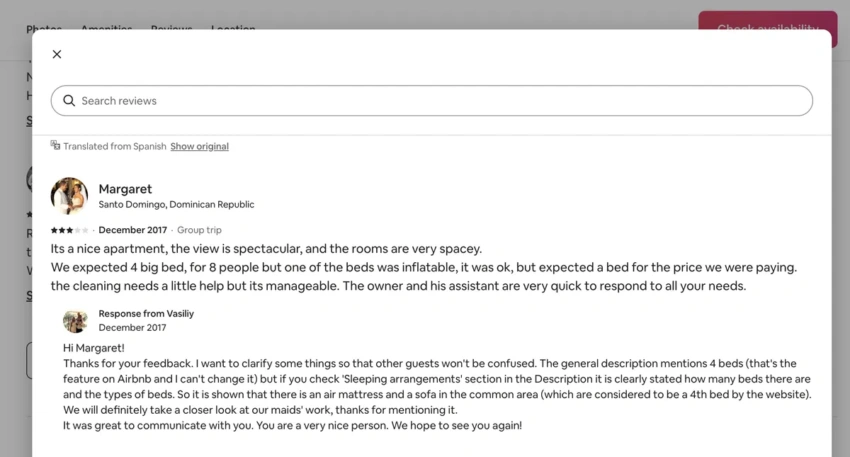
No matter how bad the Airbnb reviews are, you’ll make much bigger mistakes if you don’t respond to them and try to fix the situation.
By carefully evaluating each situation and prioritizing refunds when warranted, you demonstrate to your customers that you care about their experience and are willing to be flexible in resolving issues.
16. Not Setting Clear Rules & Expectations For Guests
By setting rules and expectations, you can maintain a harmonious environment for your guests and avoid disturbing neighboring homes. Additionally, strict and well-defined rules will deter unwanted guests from the start. By clearly stating the consequences of non-compliance, you encourage ill-intentioned people to choose a less restrictive alternative.
These rules, which are an integral part of the rental agreement, should be specific and detailed, covering aspects such as quiet hours, occupancy limits, and other relevant details.
Airbnb house rules (clickable)
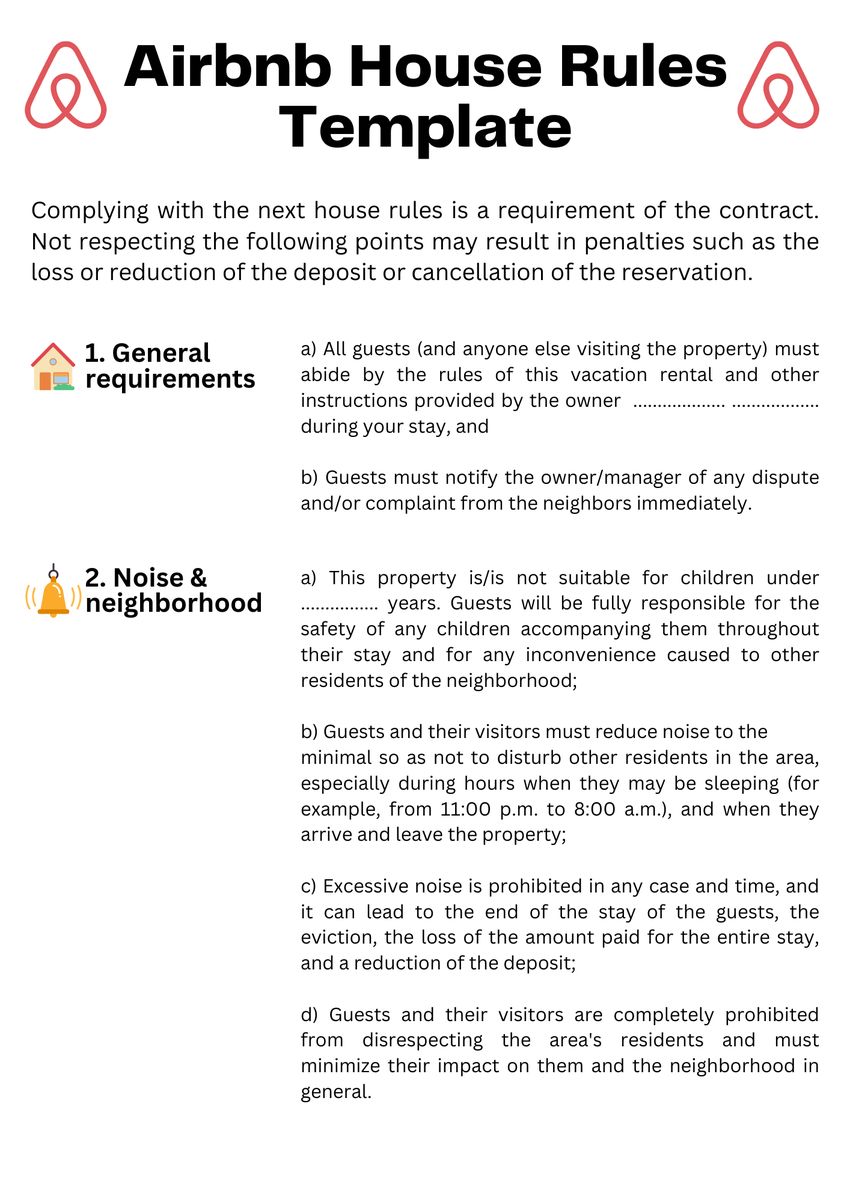
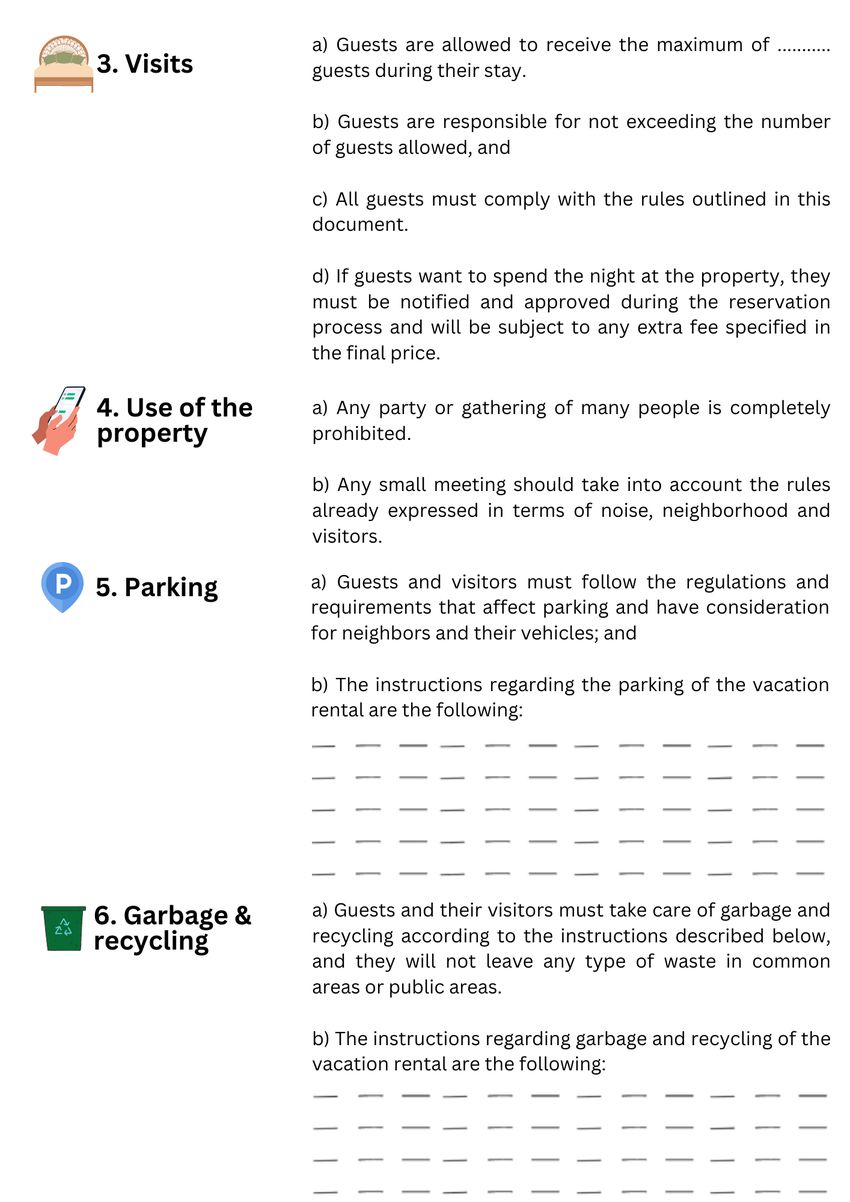
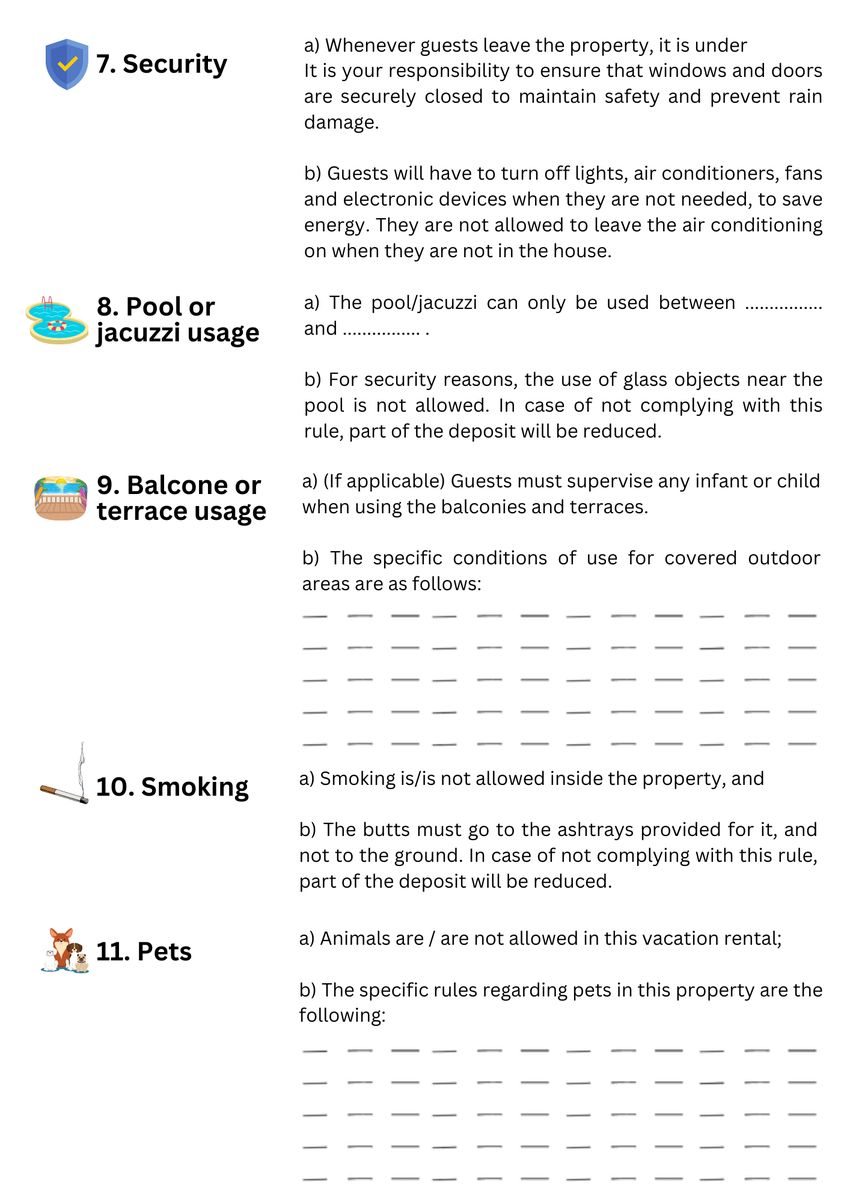

17. Lack of Flexibility on Schedules
Imagine that you come across a particularly picky Airbnb host about check-in and check-out times, and he doesn’t accept any mistakes. He asks you for a specific arrival time in front of his apartment, with a tolerance of 10 minutes under penalty of a “fine.” For your part, while traveling through the country, you are arriving from a foreign city, 450 kilometers away, and by public transport. You have no idea what time you will arrive. You try to explain it to him, but to no avail: stubborn and inflexible host.
Result: to avoid the fine, you give a very late arrival time to be sure that you will be there. You have to wait for him for almost 2 hours in front of his house before being able to collect the keys. You find his behavior completely idiotic, especially since he then tells you that he lives a hundred meters from the apartment.
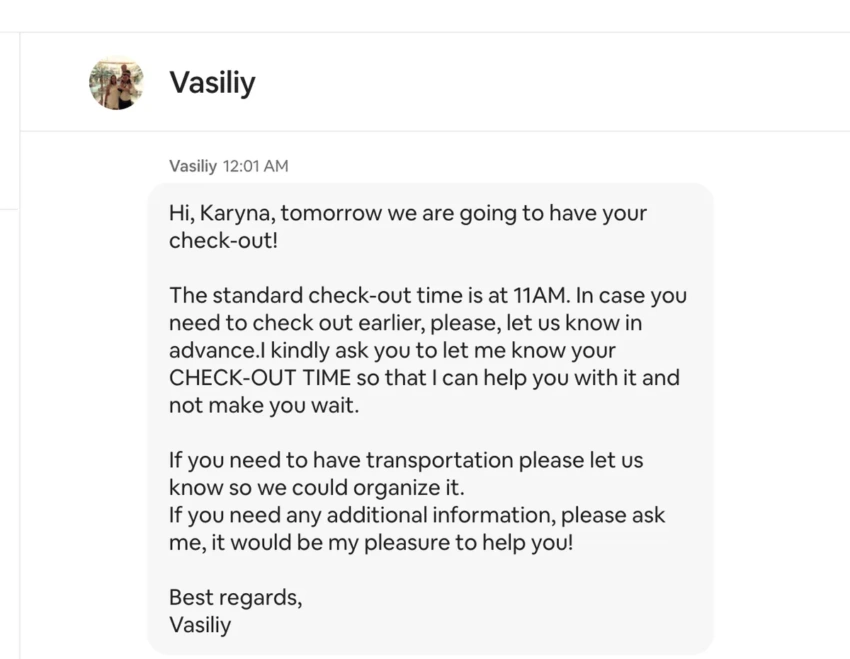
Be flexible regarding check-in and check-out time
It’s up to you, but we sincerely advise you to be flexible with your guests.
18. Being too Expeditious
When your seasonal rental business is going well, you will realize that the most annoying thing is, ultimately, the repetitive side of welcoming. But be careful: the mistakes, by being too expeditious, are to forget to show how certain objects or mechanisms in your Airbnb work and that the guest then damages or breaks them because they will not know how to use them.
Also, if you are too hasty, you risk making your guests think they are bothering you. Take the time to greet them calmly, with a big smile, and show them around the place. Answer all their questions, and before you leave, make sure they will not hesitate to contact you if they need anything.
19. Lingering too Long
This is the opposite of the previous point: be careful not to linger too long with your tenants. Often, they have just traveled a long way, come from far away, are tired, and are just waiting for one thing: to be able to sprawl on the couch and take a deep breath.
Even if mistakes like this are probably the least serious of all (because if you linger, it means that you sympathize with them), be careful not to become invasive and annoying for your Airbnb guests because they will never dare to tell you clearly.
Know how to slip away at the right time, while showing your availability throughout their stay with you.
20. Underestimating the Decoration
And finally, one of the most common mistakes Airbnb hosts make. As a host, we imagine that a good home has a good bed and is clean, tidy, and functionally equipped. We reason pragmatically: “Isn’t there anything missing?”.
Guests, on the other hand, have a different point of view when they are looking for a place to live. Beyond a roof over their heads, they are looking for a warm, cozy place where they will enjoy cocooning themselves when they come back from their walk. And that is achieved through the decoration, through the atmosphere.
For example, don’t install absolutely empty and large bookcases in the living room. The idea is good on paper, but it will be better if you fill them with books or decorative objects. Your guests will simply have the impression of being in an empty apartment and only want to go out.
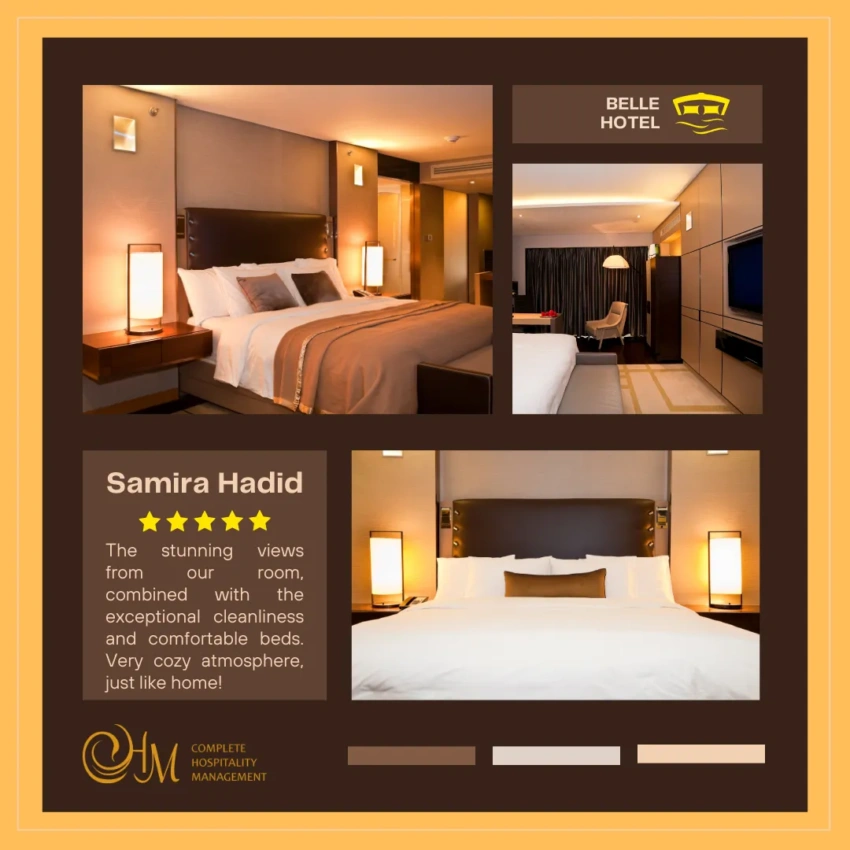
Remember that comfort is important to your guests, and this directly affects the review
If you decide to put furniture (and we highly recommend it), then fill it. No need to go overboard, a few books here and there on the shelves, a flower pot, a candle or two. A frame here and there. In short, act as if you were going to live in this accommodation, make it warm and welcoming without overdoing it. Your tenants will appreciate it!
As a conclusion
It is better to lose reservations by being honest and transparent, even if it means mentioning defects, rather than trying to convince people that you are offering a 3-star suite at a low price and that the customer ends up in a barely equipped maid’s room. The disappointment effect generates negative comments, while the “wow” effect, that is to say remaining humble in the description and offering something great, generates excellent comments and mass reservations.
If you recognize yourself in one of these Airbnb mistakes, it is not too late to correct it. The most important thing to understand when you do vacation rentals is that you should never disappoint a customer. Pay attention to all the little details we mentioned in this article, and you will be a hit!
Frequently asked questions about
Airbnb mistakes to avoid
What to do if your Airbnb host is bad?
If you find yourself dealing with a bad Airbnb host – whether due to poor communication, a misleading listing, or unsanitary conditions – there are several steps you can take to resolve the situation:
- Before escalating the issue, try reaching out to the host. Politely express your concerns and give them a chance to fix the problem. Most hosts want to maintain good reviews and will try to accommodate you.
- Take photos or videos of any misleading aspects of the listing (e.g., cleanliness issues, broken amenities, safety hazards). This evidence will be useful if you need to escalate the issue to Airbnb.
- If the host is unresponsive or unwilling to address your concerns, reach out to Airbnb through the app or website. Airbnb has a Resolution Center where guests can request refunds or alternative accommodations if their stay does not meet the expected standards.
- After your stay, write a review detailing your experience to help future travelers make an informed decision. If the host was particularly unhelpful or dishonest, this will serve as a warning to others.
Does Airbnb punish hosts?
Yes, Airbnb holds hosts accountable for maintaining high standards and may take action against those who fail to meet them. Some of the ways Airbnb can “punish” hosts include:
- Poor listing visibility. Hosts with consistently low ratings or complaints may find their listings ranked lower in Airbnb search results, reducing their booking potential.
- Fines or refunds. If a host violates Airbnb policies (e.g., failing to provide an accurate listing, canceling last-minute, or failing to meet cleanliness standards), Airbnb may require them to issue refunds or compensate guests.
- Temporary or permanent bans. Hosts who repeatedly break Airbnb’s policies – such as engaging in discrimination, fraud, or unsafe hosting practices – can have their accounts suspended or permanently banned.
To avoid penalties, hosts should stay informed about Airbnb’s guidelines, maintain high cleanliness and service standards, and promptly address guest concerns.
What are the problems with Airbnb as a host?
While Airbnb hosting can be a lucrative and rewarding experience, it comes with challenges, including:
- Regulatory issues. Many cities have strict short-term rental laws, requiring permits, taxes, or even outright bans. Not complying can lead to fines.
- High guest expectations. Guests expect hotel-like cleanliness and amenities, and a single bad review can significantly impact bookings.
- Maintenance and cleaning. Frequent guest turnover means regular deep cleaning, restocking essentials, and ongoing maintenance. Hiring cleaning services adds to expenses.
- Unreliable income. Unlike long-term rentals, Airbnb income fluctuates based on seasonality, demand, and competition. Pricing strategies must be carefully managed.
- Difficult guests. Some guests may disrespect house rules, damage property, or even cause disturbances, leading to complaints from neighbors. Airbnb does have a Host Guarantee to cover damages, but filing claims can be a hassle.
What are red flags for Airbnb guests?
To minimize issues, hosts should watch out for the following guest red flags:
- Last-minute bookings without reviews – such guests may be trying to avoid scrutiny.
- Vague or evasive communication can mean they might have intentions beyond what is allowed (e.g., parties, unauthorized extra guests).
- Local guests booking for one night, as they can sometimes be linked to parties or illicit activities.
- Unverified profiles with no reviews and who refuse to verify their identity or have incomplete profiles may not be trustworthy.
- Unusual requests asking for early check-in, late check-out, or additional guests beyond the listing’s capacity can be a sign of a problematic guest.
What if I'm unhappy with my Airbnb?
If your Airbnb experience is not up to standard, here’s what you can do:
- Determine whether the problem is minor (e.g., missing amenities, minor cleanliness issues) or major (e.g., unsafe conditions, false advertising).
- Give the host a chance to rectify the issue. Many problems, such as missing towels or faulty appliances, can be fixed quickly.
- If the issue is severe and the host is uncooperative, Airbnb allows you to request a refund or alternative accommodations.
- If the listing was misleading or uninhabitable, you may be entitled to a refund. Airbnb’s refund policy protects guests in cases of severe misrepresentation.
- Share your experience honestly to inform future travelers and hold the host accountable.
Can hosts get kicked off Airbnb?
Yes, Airbnb can ban hosts permanently if they violate the platform’s policies. Some common reasons why hosts get removed from Airbnb include:
- If a host consistently receives negative reviews for cleanliness, safety, or misleading listings, Airbnb may suspend or remove them.
- Hosts must follow Airbnb’s rules, including anti-discrimination policies, safety regulations, and cancellation policies. Repeated violations can lead to a ban.
- If a host operates an Airbnb in a location where short-term rentals are restricted or illegal, they can be banned and even fined by local authorities.
- If a host double-books, charges guests outside of Airbnb, or engages in fraudulent activities (e.g., fake listings), they will likely be removed.
- Ignoring safety standards (e.g., missing smoke detectors, unsafe conditions, hidden cameras) can result in immediate account termination.
- Any form of harassment, discrimination, or unethical behavior can get a host permanently removed.
Airbnb usually warns hosts before suspending them, but severe violations can lead to an immediate ban.
Can Airbnb hosts spy on you?
No, Airbnb has strict rules against spying on guests. However, some hosts have been caught misusing security cameras, which is a major privacy violation.
Here’s what Airbnb allows and forbids:
✅ Allowed:
- Security cameras outside the property (e.g., doorbell cameras, driveway surveillance) for security purposes.
- Devices that monitor noise levels (but do not record audio).
❌ Forbidden:
- Cameras inside the home, even in common areas (like living rooms or kitchens).
- Hidden cameras anywhere on the property.
- Audio recording devices inside the property.
Airbnb requires all hosts to disclose any security cameras in their listing. If you ever suspect a hidden camera, you can:
- Check the listing details to see if cameras are mentioned.
- Look for small lenses in vents, smoke detectors, or other unusual spots.
- Use a phone camera or scanning app to detect hidden devices.
- Report the host to Airbnb immediately if you find a hidden camera.
If a host is caught spying on guests, Airbnb will permanently ban them, and legal action could be taken against them.
What are Airbnb hosts not allowed to do?
Airbnb has strict guidelines on what hosts can and cannot do. Some key things hosts are not allowed to do include:
- Frequent cancellations without a good reason (e.g., emergency repairs) can lead to penalties or account suspension.
- Providing false information about the property (e.g., claiming there is a pool when there isn’t) is against Airbnb’s policies.
- Hosts must provide essentials like working smoke detectors, secure locks, and safe environments. Neglecting this can get them removed.
- Airbnb has strict anti-discrimination policies, and refusing guests based on race, gender, nationality, or other protected factors is prohibited.
- Hosts must not request extra fees outside the platform, as this violates Airbnb’s payment policies.
- Using hidden cameras or entering the property without notice is a serious violation.
- If a guest has a legitimate complaint, Airbnb expects the host to address it professionally.
Breaking these rules can result in warnings, penalties, and even permanent removal from Airbnb.
Can you complain to Airbnb about a host?
Yes, guests can file complaints against hosts if they have a bad experience. Here’s how:
- If the issue is minor (e.g., missing towels, WiFi problems), try reaching out to the host first. Many problems can be resolved quickly.
- If the host doesn’t respond or refuses to fix the issue, go to Airbnb’s Resolution Center to request a refund or report a problem.
- If the issue is serious (e.g., unsafe conditions, misleading listing, harassment), contact Airbnb’s customer support through the app or website.
- After your stay, leave a review detailing your experience to warn other travelers and hold the host accountable.
- If the host violates Airbnb policies (e.g., hidden cameras, discrimination, safety hazards), report them directly to Airbnb for investigation.
Airbnb takes guest complaints seriously and may offer refunds, relocate guests, or penalize hosts who repeatedly receive complaints.
What is Airbnb's biggest problem?
Airbnb faces several major challenges, including:
- Regulatory crackdowns. Many cities worldwide are imposing strict regulations, limiting short-term rentals, and requiring licenses, making it harder for hosts to operate.
- Housing affordability concerns. Critics argue that Airbnb reduces the availability of long-term rentals, driving up housing costs in some cities.
- Quality control issues. Some guests face misleading listings, unclean properties, or unreliable hosts, leading to inconsistent experiences.
- Overtourism & neighborhood complaints. Some areas experience excessive tourism due to Airbnb, causing tension with local residents who complain about noise, trash, and parties.
- Host & guest disputes. Refund policies, damages, cancellations, and unfair reviews can cause friction between hosts and guests.
Despite these challenges, Airbnb continues to evolve by implementing new policies, improving safety measures, and working with local governments to ensure responsible hosting.
Why are hosts leaving Airbnb?
Many hosts are leaving Airbnb due to increasing challenges and changing market conditions. Some of the main reasons include:
- Many cities have implemented laws limiting short-term rentals, requiring expensive permits, or banning Airbnb altogether. This makes hosting much harder and less profitable.
- Airbnb takes a percentage of earnings, and hosts must cover cleaning, maintenance, and taxes. Rising costs of utilities and supplies have made profitability more difficult.
- Unlike traditional rentals, Airbnb bookings can be inconsistent. Hosts in saturated markets are struggling with lower occupancy rates and price competition.
- Hosts face difficult guests, last-minute cancellations, damages, and Airbnb’s guest-friendly policies, which sometimes favor renters over hosts.
- Many hosts feel Airbnb prioritizes guests over hosts, enforcing strict refund policies that lead to revenue loss when guests complain.
- Some hosts are moving to longer-term rentals for more stable income and fewer management headaches.
As a result, many hosts are either selling their properties, moving to other platforms like Vrbo, or switching to direct booking models.
How do I trust an Airbnb host?
To determine whether an Airbnb host is trustworthy, follow these steps:
✅ Check their reviews & ratings:
- Look for hosts with consistent high ratings (4.8+ stars) and positive guest feedback.
- Pay attention to detailed reviews mentioning cleanliness, communication, and accuracy.
✅ Read the host’s profile & listing details:
- A good host will have a verified profile, clear bio, and a history of positive stays.
- Check how detailed and transparent the listing is. A professional host will describe the property honestly and include multiple high-quality photos.
✅ Look for Superhost status:
- Superhosts are Airbnb’s top-rated hosts who maintain high response rates, positive reviews, and a low cancellation rate.
✅ Check communication & response time:
- Send the host a message before booking. A professional host will respond quickly and politely to any questions you have.
✅ Review cancellation & house rules:
- Make sure the cancellation policy and house rules are clear and fair.
If a host has poor reviews, vague listing details, or slow responses, consider looking for a different place.
How to spot a bad Airbnb?
A bad Airbnb listing or host often has warning signs that guests should be aware of before booking. Here’s what to watch out for:
❌ Red flags in the listing:
- Vague or misleading descriptions (e.g., “cozy” for a tiny space, “up-and-coming area” for an unsafe neighborhood).
- Lack of reviews or several bad reviews mentioning issues like cleanliness, misleading photos, or unreliable hosts.
- Low-quality or few photos – a well-managed Airbnb will have multiple clear, high-resolution images of every room.
- Restrictions on communication (e.g., the host refuses to answer questions or asks you to book outside Airbnb).
❌ Red flags in reviews:
- Complaints about dirty conditions, hidden fees, or cancellations by the host.
- Multiple guests mentioning unresponsive or rude hosts.
- Reports of safety concerns, broken amenities, or hidden cameras.
❌ Red flags after booking:
- The host tries to switch you to another property last minute.
- They ask for payment outside of Airbnb (this is against Airbnb policy and can be a scam).
- The place does not match the photos or description upon arrival.
If you notice any of these red flags, contact Airbnb immediately and request assistance.
Can Airbnb hosts reject guests?
Yes, Airbnb hosts can reject or decline guest bookings, but they must follow Airbnb’s policies.
✅ Acceptable reasons for rejecting a guest:
- The guest has negative reviews or no reviews. Hosts can decline guests if their previous reviews mention damage, breaking house rules, or being difficult.
- The guest asks for rule violations. (e.g., bringing extra guests when the limit is clear, smoking in a non-smoking home).
- Overbooking or scheduling conflicts. If a host accidentally double-books or has last-minute maintenance issues, they may cancel the reservation.
- Personal comfort or security concerns. Some hosts prefer guests with a history of good reviews, especially for high-end properties or shared spaces.
❌ Unacceptable reasons for rejecting a guest:
- Discrimination. Hosts cannot reject guests based on race, gender, nationality, religion, or other protected categories under Airbnb’s anti-discrimination policy.
- Retaliation. Rejecting or canceling a booking to avoid a negative review is against Airbnb’s terms.
If a guest feels unfairly rejected, they can report the host to Airbnb, especially if they suspect discrimination.
Does Airbnb monitor guests?
Airbnb itself does not actively monitor guests in real time, but it has measures in place to track guest behavior and ensure safety.
✅ How Airbnb tracks guests:
- Airbnb requires guests to provide verified identification (ID, phone number, email) before booking.
- After a stay, hosts can leave reviews about guests. If a guest frequently gets bad reviews, they may be banned.
- Some hosts use noise detection devices (like Minut) that alert them if the noise level exceeds a certain threshold. These devices cannot record conversations.
- Airbnb allows hosts to have exterior security cameras for safety, but they must disclose them in the listing.
❌ What Airbnb CANNOT Do:
- Airbnb does not track or record guest activity inside properties.
- Hosts are not allowed to have hidden cameras or audio recorders inside the home.
- Airbnb does not actively spy on messages between hosts and guests, but it does have automated filters that flag suspicious words related to off-platform payments or prohibited behavior.
If guests ever feel their privacy is being violated (e.g., hidden cameras, excessive monitoring), they should report it to Airbnb immediately.
Updated on: . Author:

